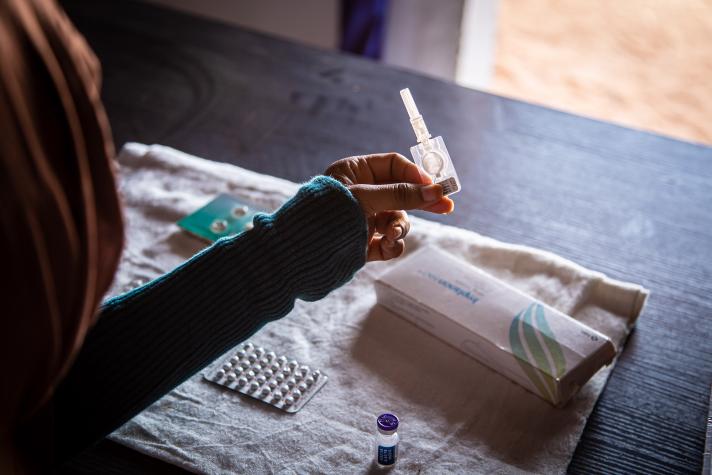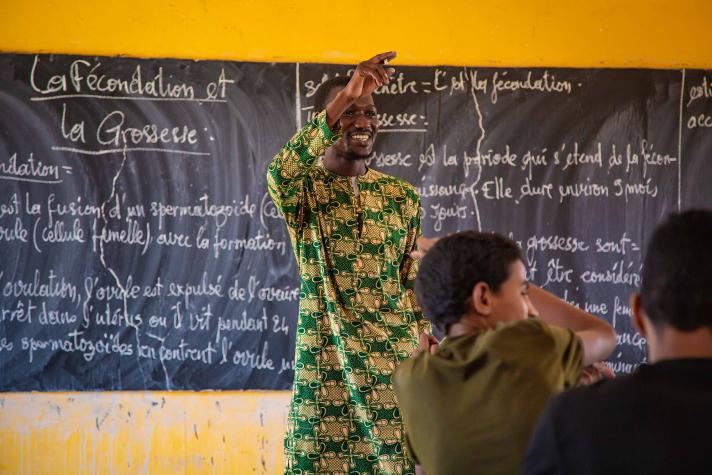Mauritania is one of the poorest countries in the world. Lack of rainfall and scarce vegetation affect the whole country. More than 11% of the country’s population are facing food insecurity, including children facing acute malnutrition.
But in the M’Berra refugee camp, refugees from Mali are facing additional challenges – challenges related to their sexual and reproductive health rights. Lack of access to contraception, early pregnancies and sexually transmitted diseases are only some of the daily challenges the women and girls in the camp face.
With EU humanitarian funding, UNICEF is supporting health education professionals working with young people in the M’Berra camp, informing them of their sexual and reproductive health rights. UNICEF also advocates integrating sexual and reproductive health in the school curricula and supports gender-equality initiatives.
In the M’Berra refugee camp, breaking down sexual taboos helps improve the health of young girls and boys.
They are dealing with a lack of contraception, early pregnancies and sexually transmitted diseases. The camp is home to around 68,300 people, out of which 37,055 are women and girls.
Working in the camp, Hamidou and Mama, 2 young health and education professionals, are committed to raising awareness among adolescents about the risks of unprotected and unsafe sex intercourse.
Mama is a midwife at health post 3 in the M'Berra refugee camp. Every day, she welcomes, listens to and advises patients facing early and difficult pregnancies and/or exposed to sexually- transmitted diseases.
Hamidou teaches natural sciences and reproductive health at the high school in the M'Berra refugee camp. Two paths, two jobs for one single purpose: to better protect the sexual and reproductive health of young girls and boys.
“Sexuality is still a very taboo subject in our societies,” explains Mama. “People are not very aware of it and men refuse to get involved in what they generally consider women's issues. This is the case for contraceptives and sexually transmitted diseases. We regularly receive infected couples, but out of pride, men refuse to follow the treatment or wear condoms.”
Access to safe contraception methods
In M'Berra camp, women face several obstacles regarding the use of contraception. In addition to limited access to contraceptive methods, they face prejudice from their spouses, the community and in some cases from health workers themselves.
Also, women who want to avoid getting pregnant may not always be able to do so due to a lack of knowledge about the issue: either they do not know how to get information about contraception methods, or they do not know how to use the various methods available.
“The family planning service opened in 2019 at the health post, to help women who do not want to get pregnant”, says Mama. “In the beginning, attendance was very low, but now attitudes are starting to change. This is largely due to awareness-raising. When we receive women for prenatal consultations, we take the opportunity to make them aware of the risks of early or closely-spaced pregnancies and the existing methods of contraception,” she explains.
“Sometimes these women are victims of early pregnancies; they are barely 13 or 14 years old! We explain to them that getting pregnant at that age is dangerous for them and their baby. Contraception is completely free. The most important thing for us is to give women the choice to decide,” says Mama.
Early pregnancy has serious health consequences for teenage mothers and their babies. According to the World Health Organization, complications of pregnancy and childbirth are the leading cause of death for girls aged 15-19 worldwide.
Early motherhood can increase the risks for adolescent girls who are not physically ready for pregnancy and childbirth and are therefore more prone to complications, as well as for newborns. Infants born to mothers under the age of 20 are at greater risk of low birth weight, premature birth and serious neonatal conditions.
"We also want to prevent the risk of unsafe abortions,” says Mama. “When women cannot get legal abortions, they resort to traditional methods (e.g., herbs) or they try to get rid of the child at birth.”
Clandestine abortions take place in unsafe medical conditions, raising the mortality risk for women as well as the risk of permanent damage to their reproductive organs.
Raising awareness at school
Unwanted pregnancies also have a terrible impact on girls' education. Many girls, once pregnant, are forced to drop out of school or are sent away from home.
Enjoying sexual and reproductive health rights includes, inter alia, the ability and possibility to have responsible and safe sex. This prevents maternal and neonatal mortality and guarantees the freedom of choice for girls and boys on whether they will have children or not. These messages are included in the course Hamidou teaches at the high school in M'Berra camp.
“My students are between 14 and 16 years old”, says Hamidou. “At that age they know almost nothing. Sexual organs are susceptible to infection, so prevention and hygiene are essential for the health of adolescents. Many don't know about the risks and complications of early pregnancies, sexually transmitted diseases, etc."
Yet concrete solutions exist, such as providing all young girls and boys with a comprehensive, age-appropriate sex education programme. This goes hand in hand with investing more in girls' education in general, (i) providing menstrual hygiene facilities in schools, (ii) fighting against child marriage and sexual violence, and (iii) building gender-sensitive societies by empowering girls and students.
“Students are very interested in my classes because they want to be better informed”, says Hamidou.
“I am aware that I have a great responsibility because it is a taboo subject that they do not discuss with their families. Here, we talk about everything, without a lot of double talks: sexuality, pregnancy, menstruation, contraception, etc. But the first thing I teach them is that they have to know how to take care of themselves: boys and girls, we are all concerned!”
Text and photos: © UNICEF Mauritania/Pouget/2021
Main picture: At health post 3 in M'Berra refugee camp, Mama raises awareness and welcomes pregnant women. © UNICEF Mauritania/Pouget/2021
Publication date: 06/01/2022





